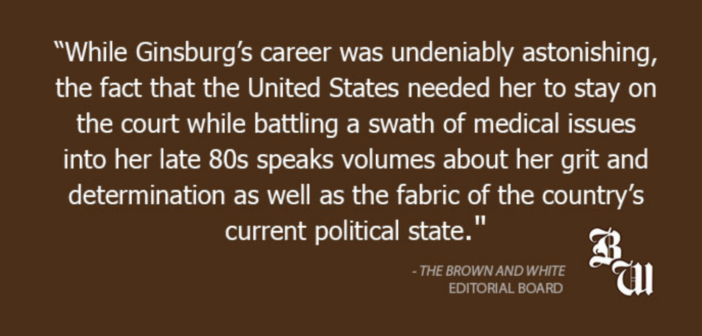At the beginning of the Jewish New Year, Rosh Hashanah, on Sept. 18, Supreme Court Justice Ruth Bader Ginsburg passed away at the age of 87.
Ginsburg was the second woman in U.S. history to serve as a justice, and throughout her 27 years in office, she made a tremendous impact as she pioneered for gender equality and women’s rights.
Ginsburg served as a symbol for justice, equality and positive social change, not only by the outcomes of her legal career but the path with which she took to embark on that career in the first place.
As a graduate of Cornell University, Ginsburg went on to Harvard Law School and was one of nine females in her entire graduating class. In addition to partaking in a rigorous course load at a male-dominated school, Ginsburg maintained her role as wife and mother throughout her entire law school experience and continued on to graduate at the top of her class.
Despite her triumphant successes throughout law school, Ginsburg continued to face sex-based discrimination in the field itself when it came to finding jobs and being taken seriously by male colleagues.
The experiences she faced as a powerful woman in the field fueled her path toward creating her legacy the U.S. knows her by today. Throughout her career, Ginsburg gave women the right to sign a mortgage and a bank account without a male cosigner, the right to have a job without gender discrimination and the right for women to maintain a job while being pregnant.
While Ginsburg’s career was undeniably astonishing, the fact that the U.S. needed her to stay on the court while battling a swath of medical issues into her late 80s speaks volumes about her grit and determination as well as the fabric of the country’s current political state.
Quite truthfully, it is tragic. Ginsburg was a source of hope and inspiration for the country in terms of fairness and equality. While she could’ve spent the last few years of her life of accomplishments resting and at home, she held on for so many years for so many of us.
It has been quoted that Ginsburg’s last wish, as dictated to her granddaughter Clara Spera, was simple: “My most fervent wish is that I will not be replaced until a new president is installed.”
However, it appears that this may not be a reality.
Senate Majority Leader Mitch McConnell has stated that the U.S. Senate will vote on Trump’s newest nominee.
This statement directly contradicts the actions taken by the Senate in 2016 following the death of former Justice Antonin Scalia. At that point in time, the Senate blocked the Obama administration from nominating a justice to fill Scalia’s seat until after the 2016 election.
The actions that McConnell and the Trump administration have taken in the two days following Ginsburg’s death are not only hypocritical but are downright immoral, and a new conservative justice will have long-term implications.
If Trump does indeed appoint a new justice before the election, the Supreme Court would be dominated by a six-to-three conservative majority — three of which would have been appointed by Trump.
There’s a lot on the line.
The fact that so much of the United States’ politics could change purely because of Ginsberg’s death is frightening.
For this reason, now more than ever, it is crucial to vote during the upcoming election. Educate yourself on the implications of what could happen for each candidate’s possible future term. While we preach knowing and understanding what is going on at the national level, there’s so much at stake at the local and state levels as well.
Do your research. Get yourself registered. Show up on Nov. 3.
It is said that when someone dies on Rosh Hashanah, that person is considered to be a “tzadik,” a title in the Jewish religion that is given to someone of utmost righteousness. Ruth Bader Ginsburg is most certainly one of the most righteous figures our generation has had the pleasure of growing up with and learning from. We thank her, we honor her memory and we hope that the legacy she left only scratches the surface of more progress to come.






Comment policy
Comments posted to The Brown and White website are reviewed by a moderator before being approved. Incendiary speech or harassing language, including comments targeted at individuals, may be deemed unacceptable and not published. Spam and other soliciting will also be declined.
The Brown and White also reserves the right to not publish entirely anonymous comments.